X
This article was co-authored by Paul Chernyak, LPC. Paul Chernyak is a Licensed Professional Counselor in Chicago. He graduated from the American School of Professional Psychology in 2011.
This article has been viewed 24,189 times.
Bedwetting is an issue that is common to more teens than one might expect. If your teen is suffering from bedwetting, the experience is likely embarrassing for them as well as for you. However, through talking with your teen about the issue, finding remedies together, and seeking out professional help, you can help your teen move past this issue.
Steps
Part 1
Part 1 of 3:
Talking to Your Teen
-
1Educate your teen. Your teen may be feeling like they are the only one who deals with this issue, as this is not something other teens are likely to share. However, you should reassure them that bedwetting is common to many teens, 1 – 3%, which actually translates to millions of people across the world. The term “enuresis” is defined as the inability to control one’s bladder. It can be caused by anything from genetics to hormone issues to very deep sleep.
- Present the information that you have learned about the potential causes behind your teen’s bedwetting and tell them what you have learned.
- Continue to assure them that they are not alone.
- Consider printing off articles for them to read themselves.
-
2Tell them if you have had this issue in the past. One other point that can be a great source of comfort to your teen is knowing if you have also undergone the issue. In many cases, bedwetting is genetic. Telling your teen that you also wet the bed at their age can help them feel less to blame for the issue and more likely to be responsive to talking and finding solutions.[1]Advertisement
-
3Listen. Your teen has likely not shared information about their bedwetting with a single other person and would probably hide it from you as well, if they could. Take some time to ask your teen if they want to talk about it or lend them a shoulder cry on.
- Listen without being judgmental.
- Allow them to vent for a while without giving any advice. Just let them let it all out.
-
4Remind them that they’re not to blame. Though they may understand that this issue is both medical and genetic, your teen will still likely feel a tremendous amount of guilt and embarrassment if the issue continues. When an incident occurs, reassure them that it’s okay, that you love them, and that everything will be fine.[2]
- Remind them that you will be with them every step of the way.
- Though it can be difficult to deal with, do not judge your teen for this, but instead show them empathy and compassion. Do not get angry, and try not to show any exasperation.
- Remember that no one wants to wet the bed. Work on finding solutions.
- Remain calm when they have accidents. Don’t yell, scream or punish them for this.
-
5Find a way to talk to a resistant teen. Your teen may in fact be too embarrassed or upset about bedwetting to even discuss the issue. In this instance, you must get a bit creative so that you can work towards creating solutions. Consider writing your teen a letter about the research you have done, share with them if you have had this issue, and propose remedies.
- Don't force solutions on your teen at this point, such as buying them a bed alarm. It's important to get the conversation going and start to break down barriers so you can talk about solutions together.
-
6Brainstorm with your teen. Before you start trying the different remedies for teen bedwetting, take some time to sit down and talk to your teen about what they would like to try. Present different options to them so they feel educated, and ask which one they'd like to try first.
Advertisement
Part 2
Part 2 of 3:
Helping Your Teen Find Remedies
-
1Try using an enema or something to relieve constipation. Though many consider bedwetting to be an issue solely of the bladder, recognize that other organs can play a factor, as well. Sometimes, a teen who is suffering from constipation can wet the bed. Suggest to your teen that they use an enema or other substance that relieves constipation.[3]
- Don’t force them but do remind them that this has worked for others in the past.
-
2Cut down on the drinks at night. One very simple solution is to have your teen cut down on the amount of beverages they are drinking before bed. Your teen could simply be drinking too much before bedtime and their bladder reacts in their sleep.
- Consider having your teen not drink anything at least one hour before bed.
- Also, make sure that your teen urinates before bed every night.
-
3Consider a bed alarm. One way other teens have overcome bedwetting is by utilizing a bed alarm. A bed alarm is slept on and goes off should it detect any moisture. This helps assure that your teen is not sleeping in urine throughout the night and can prevent them from fully emptying their entire bladder on the mattress. In many teens, this has been effective in completely ending their bedwetting.
-
4Establish a regular bedtime. Sometimes, teens wet the bed because they have an irregular sleep pattern and their body is not sure when the bladder should be active or not. Work with your teen to determine a bedtime that works well with their school schedule and see if this helps to end or lessen the bedwetting.[4]
- Consider following this routine on the weekends as well to keep up the regularity.
-
5Consider special underwear and mattress covers. Many companies make sheets or mattress covers and underwear specifically for bedwetters. Consider purchasing these special sheets or a bed protector for your teen to alleviate damage to your mattress. Rubber sheets or mattress pads can be particularly useful. Special underwear like Icon Undies can be helpful for the teen who wets the bed but wants to still sleepover at a friend’s house. These underwear prevent leakage.[5]
- The National Association For Continence (NAFC) also sells a dry night solution kit comprised of overnight underwear, washcloths, and underpads amongst other items.
-
6Assure that they are helping during the cleanup. If you are the parent or a caretaker of the teen, you may feel responsible in assuring that the mess after the bedwetting gets cleaned up. Though the bedwetting is not your teen’s fault, they certainly do have a responsibility in cleaning up the mess. Require that they wash the sheets and clean the mattress themselves after each time and assist them when necessary or should they ask for help.
- You may need to show them the first few times, as they may be unfamiliar with washing clothes or with mattress cleaning.
- Make sure they are keeping good hygiene practices, too. They should shower after having an incident.
-
7Recognize that puberty does not “cure” bedwetting. Your may find that certain doctors or websites will tell you that bedwetting is something your teen will grow out of. And while this may be true for some, you should still treat the issue like you would any other medical concern. Hoping for the day when this will end will not in fact make it end, but employing certain tactics in conjunction with seeking medical assistance can help assure that your child sleeps dry more and more often.[6]
Advertisement
Part 3
Part 3 of 3:
Seeking Professional Help
-
1Identify a doctor. Take some time to look online for doctors and see if any specialize in this area. You will likely want to seek out the help of pediatricians or perhaps a urologist. If you cannot find information online, call around to different offices to see if doctors have any experience in this area. Seeing a doctor is an important part of treatment, as the doctor can identify if the bedwetting is caused by a larger health issue.
- Consider scheduling an appointment after school hours so that your teen doesn’t miss any school.
-
2Be honest with the doctor. Your teen may be too embarrassed to talk to the doctor about their issue, but you should encourage them to do so and to do so honestly. If, however, they are unwilling to do so, you will need to step in and tell the doctor about the problem. They will likely need to know your teen’s diet, the frequency of the bedwetting, and if there are any triggers.
-
3Consider medication. There are many medicines out there to help those who suffer from bedwetting, and many of these medications are highly helpful in addressing and correcting the issue. Allow your teen to consider this option and make that choice for themselves. Research the medication to see what potential side effects exist.[7]
- Some of the medications that exist are desmopressin, which makes the kidney produce less urine, or darifenacin, which relieves bladder spasms.
-
4Consider surgery, if necessary. The doctor may likely suggest surgery to your teen. If you have tried several at home remedies and none of those have been effective at ending or reducing the bedwetting, you may want to talk to your teen about considering this option. There are three forms of surgery typically prescribed.[8]
- Sacral nerve stimulation is a surgical process in which sacral nerve roots are stimulated by neural modulation and can be helpful for those whose bedwetting was not alleviated by at home remedies.
- Another surgery is clam cystoplasty, in which the bladder is cut and a piece of intestine is inserted to make the bladder more stable and to make more room for urine.
- The final form is detrusor myectomy, which involves removing a portion of the bladder muscle to strengthen bladder contractions.
- Give your teen some time to think about these options. Do some research at home. Call your doctor if you have more questions and then make a final decision.
-
5Consider therapy if the issue is not medical. You may find that no amount of home remedies or medical attention will help your teen. In this instance, you should begin exploring roots of the problem that are non medical. Consider taking your child to see a therapist to work through these issues.
- For instance, your teen may be having a difficult time at school or may even be getting bullied.
- In some instances, teens who are bedwetting may have been a victim of sexual abuse.
- Your teen may be having a bad, recurring dream that is causing them to wet the bed.
-
6Reassure your teen that it’s okay. All of this information may feel overwhelming to your teen. Talks of surgery, medication and therapy can feel very scary and off-putting. Remind your teen that everything is going to be okay and that you’ll be there to help them every step of the way. If they should have more bedwetting experiences, that is okay, too. Remind them that you love them regardless and will help them through this.
Advertisement
Warnings
- Be patient with them.⧼thumbs_response⧽
- Never make fun of them. Never talk about such issues with somebody else.⧼thumbs_response⧽
Advertisement
References
- ↑ http://www.webmd.com/parenting/dos-and-donts-for-parents#1
- ↑ http://www.webmd.com/parenting/dos-and-donts-for-parents#1
- ↑ https://www.bedwettingandaccidents.com/single-post/2015/01/13/My-15yearold-Still-Wets-the-Bed%E2%80%9D
- ↑ https://www.sleepfoundation.org/children-and-sleep/bedwetting
- ↑ https://www.nafc.org/adult-bedwetting/
- ↑ https://www.healthychildren.org/English/health-issues/conditions/genitourinary-tract/Pages/Nocturnal-Enuresis-in-Teens.aspx
- ↑ https://www.nafc.org/adult-bedwetting/
- ↑ https://www.nafc.org/adult-bedwetting/
About This Article
Advertisement

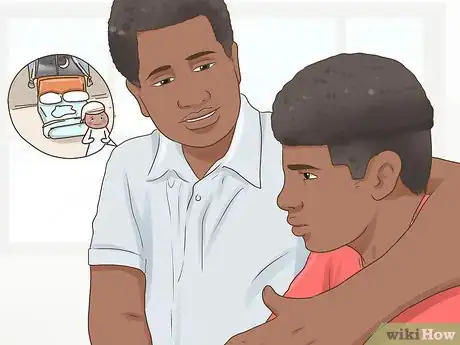

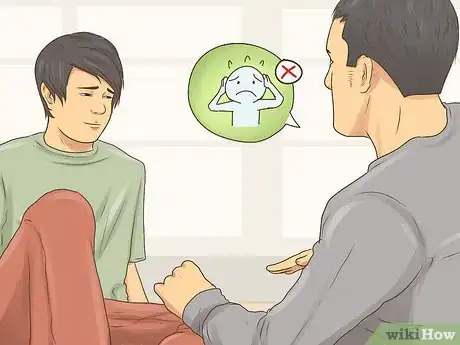

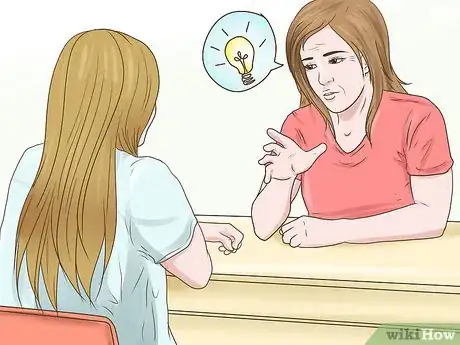
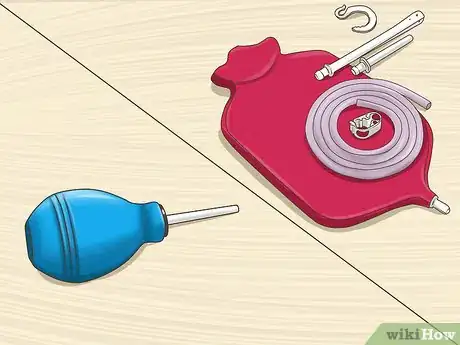
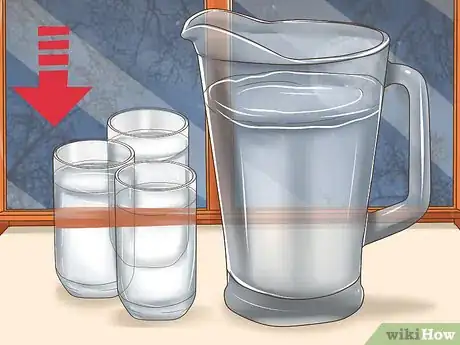
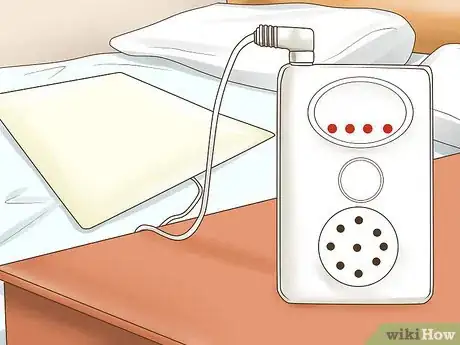

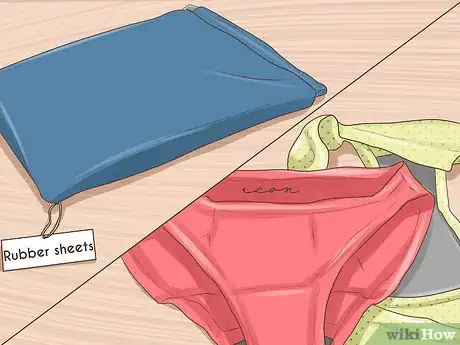
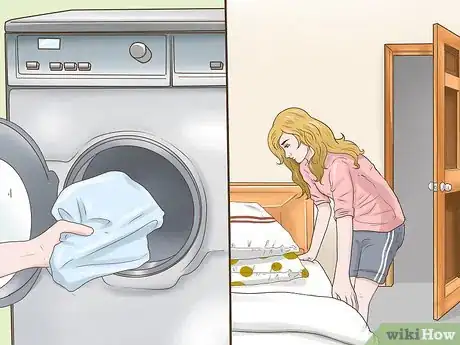
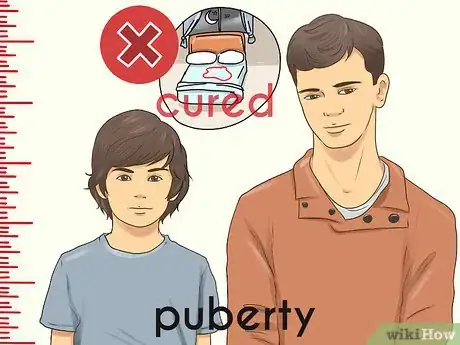


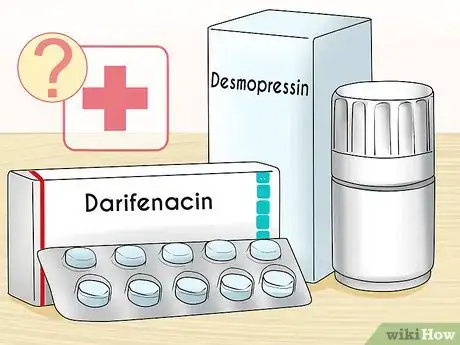


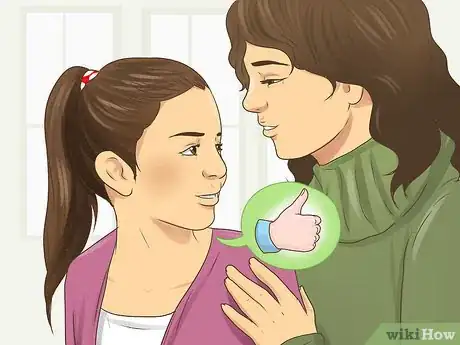
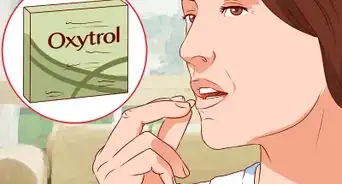

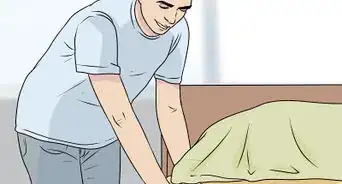
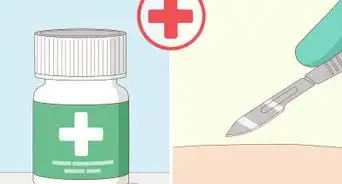



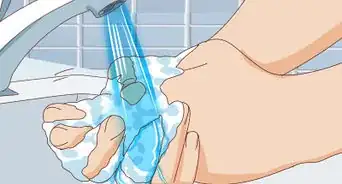














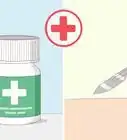




































Medical Disclaimer
The content of this article is not intended to be a substitute for professional medical advice, examination, diagnosis, or treatment. You should always contact your doctor or other qualified healthcare professional before starting, changing, or stopping any kind of health treatment.
Read More...